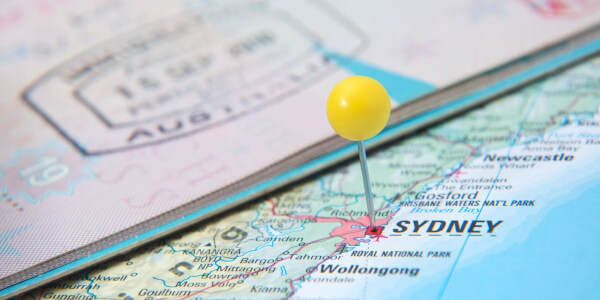Pros and cons of living in Australia vs the UK
Discover the pros and cons of living in Australia vs the UK in our handy guide, including tips on where to live in Australia and safety advice.

If you’re a UK expat living in Australia, you’ll need to get to grips with the tax system there.
One potentially complicated part of it is inheritance tax. It can be useful to know about this, especially if you have Australian relatives or have retired to Australia and plan to see out your days there.
But how does it work overseas, and does Australia even have inheritance tax? Read on to find out everything you know about inheriting property, money and assets in the country.
We’ll also show you how to send large amounts of money securely between countries using the Wise Account. This can be extremely useful if you have inheritance tax to pay, or want to send money from an inheritance back to the UK.
But for now, let’s get back to how inheritance tax works in Australia.
| Table of contents |
|---|
Inheritance tax, known as IHT in the UK, is a tax paid to the government on the estate of someone who has died. The ‘estate’ usually encompasses all property, possessions and money in the bank.
Many countries have inheritance tax systems. Depending where in the world you are, the tax may be known as estate tax, inheritance tax or succession tax.
However, not all countries have this kind of tax in place. New Zealand, Singapore, Portugal and Canada are among a handful of countries which don’t charge inheritance tax at all.¹
They may have something similar in place though, such as in Portugal where stamp duty is payable on the value of inherited assets located within the country.
Australia doesn’t have a system for charging inheritance tax on the transfer of estates from a deceased person to their heirs.
The Australian Tax Office (the country’s equivalent of HM Revenue and Customs in the UK) service also doesn’t levy anything similar to inheritance tax. For example, estate duties, gift duties, stamp duty or death duties.²
This makes it unlike the UK, where inheritance tax is due on estates valued over a certain sum.
However, this doesn’t mean that there are no taxes at all due when you receive an inheritance in Australia. You may still be liable for capital gains tax when you sell a property, for example, or income tax if you receive dividends on inherited investments. We’ll look at this in a little more detail shortly.
In countries which do have an inheritance tax system, it is either the estate that is liable for the tax, or each individual beneficiary.
In the UK, for example, the tax is paid as a lump sum by the estate before inheritances are distributed to the beneficiaries. But in European countries like France and Spain, each beneficiary needs to pay inheritance tax if they inherit more than a designated personal tax-free allowance.
It’s completely different in Australia, as neither the beneficiary or the estate have any inheritance tax or stamp duty to pay.
However, it may still be a good idea to double check that no inheritance tax is due in another country. For example, you might have inherited property held in the UK from a relative who was an Australian citizen. No tax is due in Australia, but the UK may charge tax of some kind on the transfer of property based in the UK.
It’s important to get professional tax advice to double check which country’s tax laws apply to you, especially if you live between countries or have property in multiple countries.
As Australia doesn’t have inheritance tax, there aren’t any rates, allowances or thresholds to worry about.
There are some situations though where some form of tax may be due.
One of these relates to selling real estate property in Australia that you’ve inherited from the deceased person. In this case, you may be liable for capital gains tax (CGT). This is a tax on any profits you make from the sale of an asset, the difference in value since you bought it (or in this case, inherited it).
Capital gains in Australia are taxed at the same rates as taxable income, so they vary depending on the amount of profit/income you have.
However, calculating CGT isn’t quite so simple, as there are a number of rules, discounts and exemptions to get to grips with. Here are some key points to remember:³
In addition to capital gains tax, you may also have to pay income tax if you inherit an asset that brings in income. For example, rental income from a property, or dividends from shares or other investments.
As Australia doesn’t have any inheritance tax laws, it means that all assets within an inherited estate are free from tax.
Crucially though, this may only mean assets held in Australia. If you inherit assets from another country, you may be liable for inheritance tax under that country’s rules.
To avoid an unexpected tax bill, it could be a good idea to seek professional tax advice.
After reading this, you should have a better idea of how the Australian inheritance system works. It’s great news that in most cases, you won’t have to pay any inheritance tax.
But if you do need a way to pay bills in Australia, send inherited money back to the UK or generally manage your finances between countries - Wise is a great solution.
With Wise, you can hold and convert between 40+ currencies in your online account. And you can send money worldwide for low, transparent fees* and mid-market exchange rates.
If you’re sending a large sum between countries, read our quick guide on what documents you’ll need. You might also want to know about the best UK accounts for receiving an inheritance.
Whether you’re paying foreign bills or trying to get the best exchange rates when repatriating funds from overseas back to the UK, your Wise account can do it all.
Here are some of the most commonly asked questions:
There is no inheritance tax in Australia, so this essentially means that there’s no upper limit on the amount you can inherit tax-free. This includes everything from money and real estate to investments and other kinds of property.
Bear in mind though that you may have to pay other kinds of tax related to inheritance in Australia, such as income tax or capital gains tax (CGT).
Australia doesn’t charge any inheritance tax on assets you inherit from abroad, such as back home in the UK.
However, you may still be subject to inheritance tax here in the UK. The threshold for paying inheritance tax is currently set at £325,000.⁵ So if you inherit anything above this value, you may have UK inheritance tax to pay.
Yes, the UK and Australia have a double taxation agreement in place. This kind of agreement is designed to prevent an individual from paying tax twice, on the same income - once in the UK and again in Australia.
As Australia doesn’t have inheritance tax, the double taxation agreement doesn't really apply. However, it may apply to other kinds of taxes, such as income tax or capital gains tax.
As with all things tax-related, it can be complicated - so it’s best to get expert tax advice to understand your obligations and find the best way to manage your money between countries.
Many countries worldwide have no inheritance tax system, although other systems such as stamp duty or transfer tax may be used instead.
Here are just a few of the countries which don’t have inheritance tax, aside from Australia:⁶
Sources used:
Sources last checked on date: 18-Jul-2025
*Please see terms of use and product availability for your region or visit Wise fees and pricing for the most up to date pricing and fee information.
This publication is provided for general information purposes and does not constitute legal, tax or other professional advice from Wise Payments Limited or its subsidiaries and its affiliates, and it is not intended as a substitute for obtaining advice from a financial advisor or any other professional.
We make no representations, warranties or guarantees, whether expressed or implied, that the content in the publication is accurate, complete or up to date.

Discover the pros and cons of living in Australia vs the UK in our handy guide, including tips on where to live in Australia and safety advice.

Find out how income tax in Australia works for foreigners in our handy guide for UK expats, overseas workers and digital nomads.

Can I keep my Australian bank account if I move abroad? Find out everything you need to know here in our handy guide.

The complete guide to buying property in Australia as a foreigner. Read about how to buy Australian property, average prices, fees, and more.

Here’s what you need to know about private healthcare in Australia for expats. Learn about the best providers, costs and more.

Everything you need to know about Australia's new Skills in Demand visa which came into effect in December 2024.